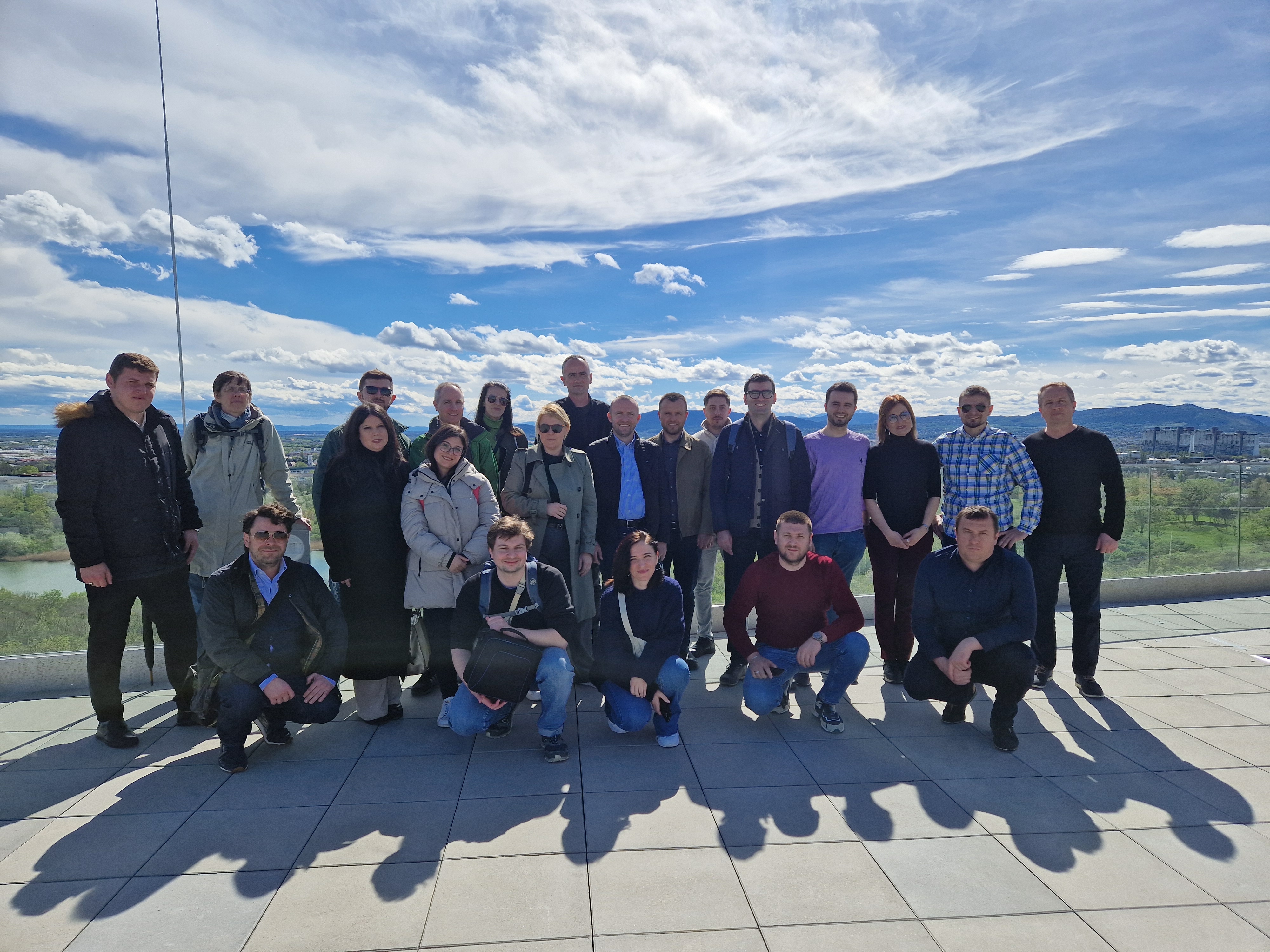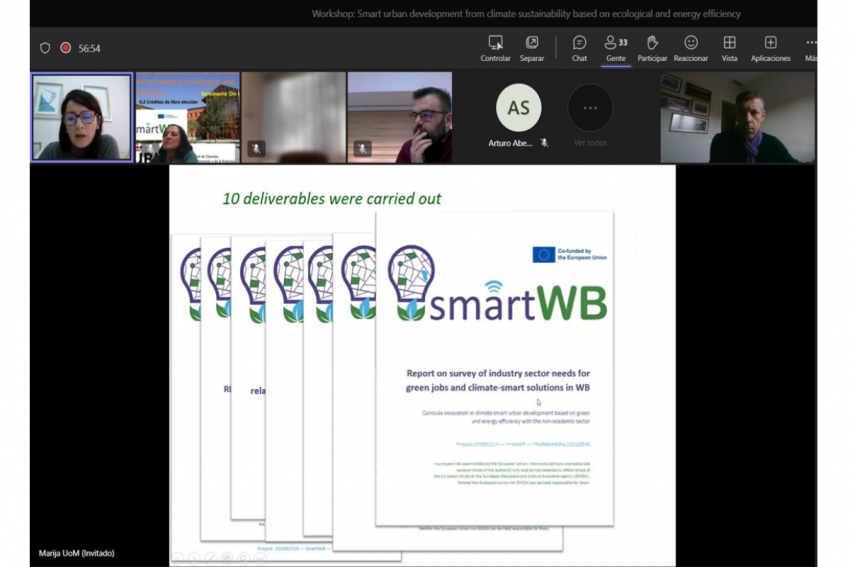Workshop in Tirana - Polytechnic University of Tirana
On May 22, 2025, the Polytechnic University of Tirana hosted a workshop focused on promoting green job opportunities in urban development. The event brought together academic experts, city planners, and civil society representatives to share innovative practices and discuss low-carbon solutions for sustainable urban development. Local and regional case studies showcased how urban development strategies can foster green employment pathways. In the final session, participants engaged in an interactive discussion on scaling green skills across industries, identifying strategies to equip the workforce for future challenges in climate-smart urban planning.
Download the agenda from the following link: agenda
Photos: LINK
SC and PMC meetings - University of Zagreb
The SC and PMC meetings were held at the Faculty of Geodesy, University of Zagreb, on December 10 and 11, 2024. The two-day participants exchanged knowledge and experience, focusing on the key topics of the project. Among other things, progress in the implementation of new and modernized courses, as well as student internships, was presented. It was discussed about the realized round tables at the universities that are partners in the project.
Presentations on project dissemination were held, and further action directions were defined.
Downloading the agenda on the following link:/uploaded/files/Zagreb%20Meeting%20Agenda%20FINAL%20%281%29%20%282%29.docx
Photos: https://www.ucg.ac.me/objava/blog/1287/objava/190154-8-foto-galerija
The project meeting - THOWL University in Hoxter
The project meeting, held from June 13 to 14, 2024, at the THOWL University in Hoxter, Germany, was led by Professor Dr Martin Oldenburg from the Department of Environmental Engineering and Applied Computer Science. In her introductory greeting, the vice president for education and sustainability, Professor Dr Yvonne-Christin Knepper-Bartel, emphasised the importance of such an international academic exchange in climate-friendly urban development and wished the event a good run. The inter-project coaching session gathered the participants to report on other projects dealing with the project topic. The intention was to demonstrate the project participants' existing expertise and improve cooperation in the relevant areas. All partners involved were represented on-site and in a hybrid format. In the second part of the session, partners provided reflections on the SmartWB project, and lessons learned and good practices were exchanged. The meeting was unanimously regarded as a pivotal and productive step towards future collaboration, not only within the project but also for upcoming projects. The conducive atmosphere and environment at the university were particularly appreciated.
Photos https://www.smartwb.ucg.ac.me/gallery.php?id=14
Agenda: link
Theme-based training of teaching staff to acquire new practical skills - Vienna, Austria
From April 3rd to 5th, 2024, the University of Natural Resources and Life Sciences, Vienna (BOKU University), hosted a theme-based training as part of the SmartWB project "Curricula innovation in climate-smart urban development based on green and energy efficiency with the non-academic sector". There were 18 participants, from 8 institutions. This training aims to build the capacity of teaching staff from Western Balkan higher education institutions (HEIs). The training offered a blend of theoretical knowledge and practical skills through presentations on innovative tools like the 'LandscapeLab' and guided tours of the Hydraulic Laboratory. Also, an immersive visit to the 'Biotope City Wienerberg' and Wienerberg Park was organised. This visit showcased positive practices in smart and sustainable solutions for designing and planning residential and recreational spaces, highlighting the importance of integrating nature within urban environments for enhanced community well-being. The workshop also provided hands-on didactics training focusing on applied teaching and learning, employing the think-pair-share methodology. The teaching staff from HEIs received comprehensive guidance and insights on orchestrating group work among students and incorporating modern digital tools into their teaching practices, promoting an interactive and collaborative learning atmosphere. Participants were also treated to a social event at a traditional Austrian restaurant, facilitating informal exchanges and peer networking. This comprehensive program provided participants with new practical skills and fostered collaboration and the exchange of ideas among academic professionals from the Western Balkans, contributing to advancing green and energy-efficient practices in urban development education. According to the event evaluation, the training was well organised and the communication was precise. The provided materials were appreciated by the participants. The varied training programme with many interdisciplinary topics and interactive group work was described as ‘innovative’, ‘inclusive’, ‘interesting’ and ‘helpful’. Overall, the event was considered successful with ‘good input’ given and ‘great exchange’. There were plenty of opportunities for socialising, sharing ideas and experiences. The overall success of the event was rated slightly lower than the general organization and general communication categories, with more people choosing grade 4 ('Good'). Nevertheless, the majority of the participants still assessed all three aspects (Mode of reaching the decisions at the event; Opportunities to express your opinion and influence decisions; Assessing the fulfillment of expectations regarding the event) as 'excellent'.
Photos: https://www.smartwb.ucg.ac.me/gallery.php?id=13
Agenda: /uploaded/files/2024%2003%2027_SmartWB-T3.3_Workshop-Vienna-Program_V4.pdf
Meeting report: /uploaded/files/2.%20Vienna%20Event%20Report.pdf

Theme-based training of teaching staff - Hoexter, Germany
The theme-based teacher training, organised by Martin Oldenburg and Anna Mues, OWL University of Applied Sciences and Arts, occurred in Hoexter, Germany, from March 19 to 21, 2024. There were 20 participants in the training. On the first day, the Vice President of Education, Yvonne Knepper-Bartel, introduced the participants to the OWL University of Applied Sciences and Arts. After this introduction, the campus and the botanical garden at THOWL in Hoexter were presented. Then, several laboratories were shown. These included the energy lab with solar cells and hydrogen batteries, the water lab with the ILIAS course structure, and learning videos. Afterwards, the participants were introduced to observing activated sludge (from a wastewater treatment plant) by microscopy and exploring a "new world".
In the afternoon, TH OWL's digital learning platform was presented with virtual tours (interactive 360° shots of a wastewater treatment plant with videos). Finally, landscape architect Hendrik Laue gave insight into his research using systemic approaches and his teaching philosophy. The second morning was dedicated to the Lego Serious Play "LPS "by Tanja Osterhagen. Lego was used to visualise ideas, and participants engaged in lively discussions and created more models in groups. In the afternoon, participants were asked to create a course's structure and learning objectives, including integrating and using a learning management system.
Finally, Joerg Felmeden presented the network project "Waterplus EWL," which concerns the regular exchange and use of companies' and municipalities' capacities related to water. In the evening, the participants enjoyed Thai and Indian food. On the third and final day, the group left early to head west to the Ruhr region, to Essen. The Emschergenossenschaft (EGLV), a public corporation with statutory responsibilities, invited them on a bicycle tour of this important industrial and business location. The first stop on the tour was the Emscher River. There, Mario Sommerhaeuser (EGLV) told the river's history. Until the 1990s, the Emscher was an open sewer. Then, more sections were naturalised, and the river has recovered today.
Other stations included converting industrial areas into residential and recreational areas. Ulrike Raasch and Anke Gebhard explained the challenges and approaches to the participants.
Photos: https://www.smartwb.ucg.ac.me/gallery.php?id=12
The agenda: /uploaded/files/Meeting%20Agenda%20Hoexter%20v06.pdf
Meeting report: /uploaded/files/Report%20theme-based%20training%20Hoexter_25032024.pdf
Staff Training in Spain: Theme‐based training
The staff training was held in Madrid from December 12 to 14, 2023, organised by the Rey Juan Carlos University. There were 30 participants in the training. On the first day of the workshop, the lectures were about past and current Engineering and Technical School (ETSIT) projects in Energy Efficiency in Building using WSN (wireless sensor networks). Also, a workshop was held on monitoring management and visualisation techniques in DashBoards for a time series ideal for monitoring systems in smart spaces. The workshop was also about creating digital twins with alternative software to create spaces intelligently and categorise them. In addition, participants had the opportunity to listen to lectures on educational gamification and create podcasts. On the last day, a workshop was held on circular economy for sustainable waste management. A visit to the Municipal Housing Institute of Fuenlabrada IMVF was organised, where directions for energy efficiency in the city and new projects were presented. A visit to the packaging recycling plant (Fuenlabrada) was also arranged. Results of the evaluation survey are positive, and most evaluations are between 4 and 5, predominantly 5 (highest satisfaction scores).
Photos: https://www.smartwb.ucg.ac.me/gallery.php?id=11
Agenda: /uploaded/files/SmartWB%20-%20Agenda%20training%20-%20URJC%20-%20Madrid-final%20version.pdf
Online Workshop: Smart urban development from climate sustainability based on ecological and energy efficiency
The online SmartWB workshop was held on November 29, 2023, in the Universidad Rey Juan Carlos (URJC) organisation. Carmen de Pablos-Heredero, a full-time professor at Rey Juan Carlos University, introduced the seminar and the participants in the session. The workshop's objective was to present the results of the Smart WB Erasmus Plus Project so far and outline some of the main challenges and next steps in the project. Professor De Pablos-Heredero highlighted the training session that will be developed in mid-December at URJC’s Fuenlabrada Campus, with more than 30 participants from different European countries attending. Professor Marija Jevric from the University of Montenegro, who is in charge of the project’s coordination, presented the objectives and scope of the project. She highlighted the importance of modernising the university courses in Western Balkan Universities and trying to harmonize the content of the curricula in their universities with the curricula in EU universities, emphasizing the idea of increasing sustainability consciousness both in teaching staff and students. Professor Jevric presented the activities developed in the project so far and the upcoming steps. Professor Merima Shahinagic-Isovic from the University of Mostar in Bosnia-Herzegovina presented the current situation in her country's complex cultural, social and political context. She highlighted the main challenges they are facing, such as very important car dependency, as well as the potential solutions and plans being implemented in Bosnia-Herzegovina to face those challenges. Professor Martin Oldenburg from THOWL University (Germany) presented the general lines of EU initiatives and policies related to urban development. He detailed the goals of EU initiatives and policies as well as explained the objectives that have been called “The European Green Deal”. Professor Oldenburg described some of the most relevant initiatives being implemented in the countries involved in the project – Austria, Croatia, Serbia, Germany, Norway and Spain -. Finally, he presented some good practices from different countries that can be used as benchmarks for the project. Professor Genti Qirjazi from the Polytechnic University of Tirana, Albania, presented the Report on existing curricula on Climate Smart Uban Development in EU Member States and Third Countries not or associated with the Programme comparing Western Balkan’s Universities programs and Curricula and EU and Serbian ones. The report presents a general overview of the current situation and detects potential points, topics and issues that could be included in modernising Western Balkan Universities’ Curricula. Professor Qirjazi concludes that there is space for improvement, harmonisation, and modernisation of curricula in Western Balkan countries that are involved in the project.

Professor Florian Rheinwald from BOKU University in Vienna, Austria, presented the Report on climate-friendly and innovative solutions in urban development. In the report, the policy fields related to Climate Smart Urban Development presented are Spatial and Urban Planning, Planning and Participation Procedures, Architecture and Building Design, Material Science, Energy Efficiency, Urban Water Management, Road & Design and Mobility, Geodesy and Analysis and Governance and Planning Procedures –. Professor Rheinwald presented some examples of advanced initiatives throughout the European Union –particularly from Austria – that can help modernise curricula. He highlighted the importance of governance and planning policies, the relevance of commitment and participation of citizens and people, and the role of education. Finally, he presented the most relevant conclusions of the Workshop that BOKU University hosted in Vienna at the end of May. He described the most relevant topics for each Western Balkan country involved in the project – Montenegro, Albania, Bosnia-Herzegovina – and the analysis's conclusions expressed in a SWOT matrix. He concluded that the challenges are very similar for EU and Western Balkan countries and that public awareness of sustainability should be increased.
Staff Training in Norway: Uncovering Urban Development Insights
SmartWB Staff Training in Norway took place from August 29th to 31st, 2023, in Ås and Oslo, organised by the Faculty of Science and Technology, NMBU. There were 17 participants in the training, from 8 institutions. This three-day event offered a unique opportunity for educators and professionals to enhance their practical skills in climate-smart urban development. Participants were introduced to NMBU's teaching and research endeavours in the extended presentation by Prof. Harsh Ratnaweera. Furthermore, participants had the privilege of hearing from Prof. Anders Q. Nyrud about timber as a sustainable urban building material and immersive lessons on Geomatics and International Project Development skillfully delivered by Prof. Ivar Maalen-Johansen. A visit to NMBU's labs and pilot facilities provided participating teaching staff from WB countries valuable insights into student activities within these labs. The second day of training took participants to various sites in Oslo, unveiling the intricacies of urban design and water management. At Voldsløkka School, experts shared their knowledge on managing climate change impacts and urban architecture with historical conservation values. The final day's training, hosted at DOSCON AS, was about water quality surveillance and process control innovations. Experts also shared their expertise in sewer design and planning. Furthermore, participants listened to the experience of using ChatGPT and exploring digital tools in education at NMBU. The participants were satisfied with the delivey of the event. This was shown in their high ranking for the logistics and arrangements of the event as well as the content of the agenda. Additionally, the participants showed their appreciation to the Norwegian team’s for their well-organization for the event.
Photos: https://www.smartwb.ucg.ac.me/gallery.php?id=10
From the link, you can download the agenda: /uploaded/files/SmartWB%20-%20Agenda%20training%20-%20UNI%20%282%29.pdf
Meeting report: /uploaded/files/6.%20Norway%20Report%20training.pdf
Presentations: P1, P2, P3, P4, P5
Team-based training in Niš, Serbia
From June 14th to 16th, 2023, within the Erasmus+ project SmartWB, a remarkable training event occurred at the University of Niš and the Faculty of Civil Engineering and Architecture. There were 24 participants in the training. Fifteen educators from higher education institutions in Albania, Montenegro, and Bosnia and Herzegovina came together to participate in this enriching program. The training was a dynamic platform for sharing ideas and exploring cutting-edge approaches to enhance architecture and civil engineering teaching practices. One of the highlights of this event was the integration of digital tools, which opened up endless possibilities for teaching and learning. The evaluation's results indicated that the event had been successfully completed.
Photos: https://www.smartwb.ucg.ac.me/gallery.php?id=9
Downloading the agenda for the training is a simple process. Just click on the following link: /uploaded/files/Agenda%20Vienna.pdf
Meeting report: /uploaded/files/7.%20SmartWB%20-%20Report%20training%20Nis.pdf
Presentations: P1, P2, P3, P4,P5
Workshop&First SC and PMC meeting in Vienna, Austria
The "Workshop on Climate and Innovative Solutions: Current and Future Challenges" was held at BOKU University in Vienna from May 31 to June 2, 2023. There were 24 participants in the workshop, from 14 institutions. 16 people, from 12 institutions attended SC meeting; 10 people from 9 institutions attended PMC meeting; and 5 people from 5 institutions attended QAC meeting. It was organised as part of a project and attended by representatives from partner countries such as Albania, Bosnia and Herzegovina, Montenegro, and representatives from program countries such as Austria, Germany, Spain, Croatia, Norway, and Serbia. The evaluation's results indicated that the event had been successfully completed. According to the survey results, there were no suggestions for the improvement.
Photos: https://www.smartwb.ucg.ac.me/gallery.php?id=8
Downloading the agenda for the training on the following link: /uploaded/files/Agenda%20Vienna.pdf
Meeting report: /uploaded/files/8.%20Vienna%20-%20Overall%20Workshop%20report.pdf
Team-based training in Dubrovnik, Croatia
Training for teaching staff was held from May 9 to 11, 2023, at the Center for Advanced Academic Studies of the University of Zagreb in Dubrovnik. There were 20 participants in the training, from 9 institutions. Representatives of the universities of Albania, Bosnia and Herzegovina, and Montenegro, the partner countries, attended the training. The three-day program aimed to highlight the importance of guidelines for education development in the digital revolution era. Topics such as the digital revolution in education, the application of the Bologna Declaration to the education system and curriculum development, and examples of using mobile applications with software support as an educational tool were covered. The training ended with a session on sustainable development and smart cities, which sparked discussion and many questions. The evaluation's results indicated that the event had been successfully completed. The planning, communication, and fruitful conversations all received positive feedback from the attendees. The meeting's goal has been accomplished, based on the remarks and reactions. Photos: https://www.smartwb.ucg.ac.me/gallery.php?id=7
From the link, you can download the agenda: /uploaded/files/Agenda%20UNIZG%20Dubrovnik%20training.pdf
Meeting report: /uploaded/files/9.1%20Event%20evaluation%20report_Dubrovnik.pdf
The kick-off meeting in Podgorica, Montenegro
The kick-off meeting was held in Podgorica at the Faculty of the Civil Engineering University of Montenegro on February 23rd and 24th, 2023. There were 32 participants from 17 institutions. After the opening ceremony and project presentation, which introduced project technical details and directions from NEO, the partners presented themselves, emphasising their higher education research potential and practices and their role in SmartWB. The SmartWB project bodies were given. According to the evaluation results, the event itself was successfully completed. The participants were satisfied with the organization, communication, and constructive discussions. According to the comments and reactions, the purpose of the meeting has been achieved. Photos: https://www.smartwb.ucg.ac.me/gallery.php?id=6
Agenda PDF format.
Meeting report: /uploaded/files/10.1%20Report%20on%20the%20Kick%20off%20meeting.pdf

